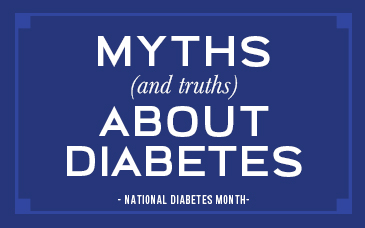
Diabetes seems to be one of the diseases that medical professionals have figured out at several levels. Interestingly, despite of all the knowledge and remedies created to battle the disease, diabetes still persist to make life difficult for millions without regard for age or race. According to CDC, there are 30 million people suffering from diabetes in the United States and a quarter of them are not even aware that they have it.
In celebration of November as the National Diabetes Month, we hope to shed some light on differences between type 1 and type 2 diabetes, know the truths versus myths about the disease, as well as share better practices to apply if you or your loved one have the disease.
There are a few distinctions between type 1 and type 2 diabetes. People with type 1 diabetes cannot produce insulin. Their immune system attacks its own self and mistakes it for “bad bacteria”, which destroys the cells and the natural way the body produces insulin. Type 1 diabetes is also usually caused by genetics, and is the type that is less common. Type 2 diabetes is characterized by resistance to insulin. People with type 2 diabetes have a resistance to insulin, a condition when the body still produces insulin but the body doesn't respond to it as well as it should. This type of diabetes usually has to do with lifestyle factors such as inactivity, weight gain and diet.
Now that we have discussed the difference between the types of diabetes, let’s look at the 10 common myths and see if there are fragments of truths in them.
MYTH 1 - If you’re overweight, you will develop type 2 diabetes.
- FALSE. Although being overweight is a risk factor to developing type 2 diabetes, it does not mean that you will automatically get it. There are other factors that can lead you to developing diabetes, such as the amount of exercise you do, your family history and your age.
MYTH 2 - Diabetes is caused by eating sugar.
- FALSE. Sugar alone is not what contributes to diabetes, but your entire diet as a whole.
MYTH 3 - Sugary drinks cause diabetes.
- TRUE! Research shows there is a link between sugary drinks and type 2 diabetes. The American Diabetes Association advises people to stay away from sugary drinks to help prevent diabetes.
MYTH 4 - Diabetes is a serious disease.
- TRUE. According to the American Diabetes Association, having diabetes can double your chance of having a heart attack.
MYTH 5 - Having diabetes means you have to eat special foods.
- FALSE. In order to manage your diabetes, it’s important to eat a healthy diet. It’s recommended to eat foods low in saturated fat, lean proteins, whole grains, and fruits and non-starchy vegetables. There are foods that say that they’re specifically for those with diabetes, but its found that they don't offer much of a benefit. Just maintain a healthy lifestyle and watch what you take into your body.
MYTH 6 - If you have diabetes that means you have to eat small amounts of bread, pasta and potatoes.
- TRUE AND FALSE. It’s never recommended for anybody to eat a great deal of starchy foods but what holds more importance are the portion size as well as the type of bread, pasta and potatoes you consume. Try to choose whole grain when possible. Those high-starch foods can be included in your diet as long as you control the amount you eat.
MYTH 7 - People with diabetes cannot have chocolates or sweets.
- FALSE. Same as the myths above, it is all about controlling how much you eat. Portion control and exercise is key.
MYTH 8 - I can catch diabetes from someone else.
- FALSE. Diabetes is not like the flu or a cold, you cannot catch it from someone else.
MYTH 9 - I will be prone to illnesses more if I have diabetes.
- FALSE. There is no proof that your body will be prone to getting sick more often than those without diabetes. But, it is advised that those with diabetes get flu shots because if you do happen to get sick, more complications can occur.
MYTH 10 - If I have to start taking insulin, that means I do not control my diabetes properly.
- FALSE. Diabetes 2 is considered a progressive disease and over time, just like everything else, the body gradually produces less of its own insulin, so you may need to give your body an extra boost.
Sources:
https://www.healthline.com/health/difference-between-type-1-and-type-2-diabetes#causes

